Wolf Pack Street Patrol spends nights helping Montreal's Indigenous homeless
New volunteer group modelled after Winnipeg's Bear Clan
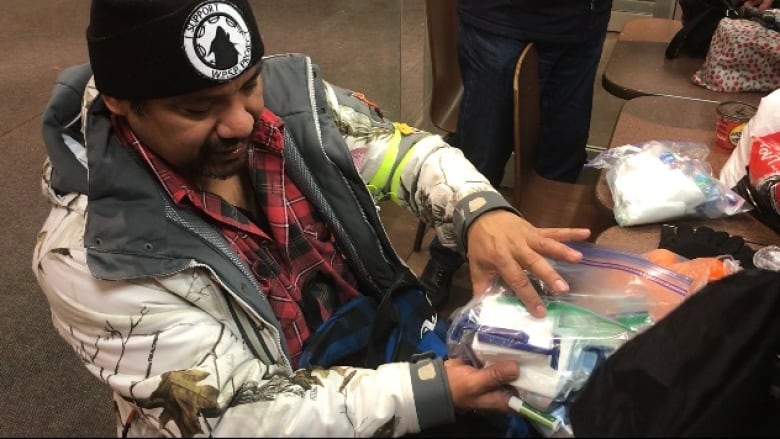
Three nights a week, they hit the streets of Montreal with sandwiches, socks and toothbrushes. They're looking for people in need, who are often Indigenous. They'recalled the Wolf Pack Street Patrol.
It's Tuesday night. At a downtown Montreal coffee shop, Al Harrington is getting a group of eight volunteers ready for their night. The supplies they have collected, most of them donated, are being divided and packed up in plastic bags: things like socks, toothbrushes, toothpaste, first aid kits, tampons and deodorant. Group members also carry sandwiches, snacks, juice boxes and fruit in bags and backpacks to give out.
After deciding their route and putting on warm clothes with distinctive reflective armbands, the men and women are ready to hit the streets for the evening to help those in need.
"They see our armbands and they're curious of who we are and what we're doing," said Harrington.

The Wolf Pack Street Patrol is a new initiative in Montreal. It's modelled after the Bear Clan, a group of volunteers that gives a hand to homeless people in Winnipeg.
Harrington, who is Ojibwayfrom Shoal Lake First Nation in Ontario, wanted to find a way to help vulnerable Indigenous men and women in the city, spurred by missing and murdered Indigenous women and girls and the recent court cases in the deaths of Colten Boushie and Tina Fontaine.
After attending a meeting about the housing needs of Indigenous peoplein Montreal in February, Harrington decided to take action. A high proportion of the city's homeless are Indigenous. Indigenous people make up less than one per cent of the city's population, but 10 per cent of the homeless in Montreal, according to a 2015 survey. That survey numbered the city's total homeless population at 3,000.
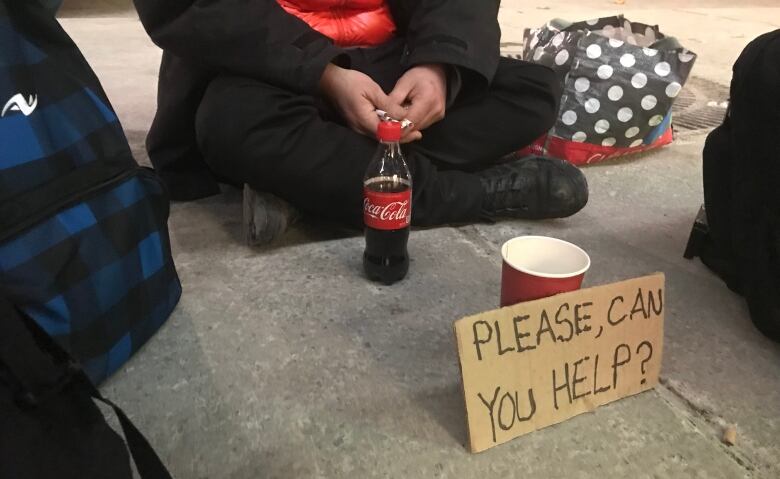
Harrington is involved in Montreal's Indigenous community, organizing powwows, round dances and other events. He became aware of the challenges and needs of homeless people in the city as an outreach worker with the Native Friendship Centre of Montreal. While there he did similar work to the new patrol, but during the day.
But Harrington says it is at night that people without shelter need help the most, especially when it's cold.
Sandwiches and sage
Three times a week, from 8 p.m. to midnight, the Wolf Pack Street Patrol is on the move. The patrol begins at Cabot Square, a well-known gathering place for Indigenous people, and continues to Berri Street, about 30 blocks east on Ste-Catherine Street, in downtown Montreal.
Split up into two groups of four or five people, depending on how many volunteers come out, they talk to people living on the street, offering them sandwiches and other basic but essential items. Along the way, the patrol gets other requests for things like cigarettes, blankets and coats.
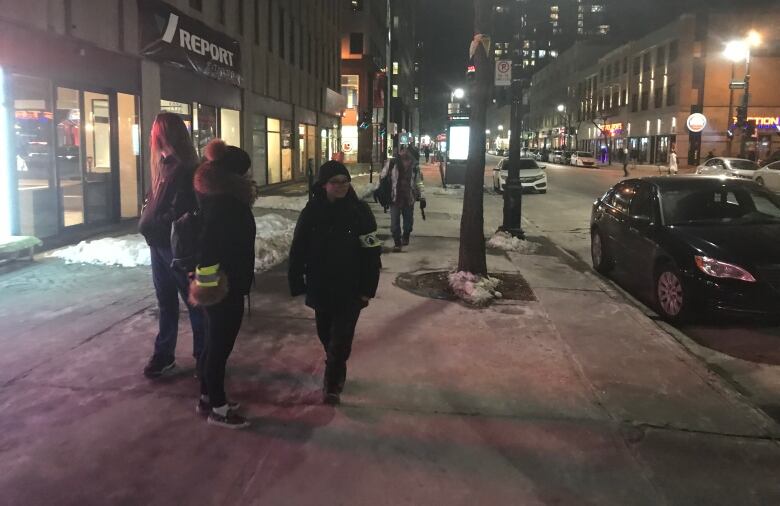
Not everyone on the street knows yet who the group is or what they do. One of those people they met Tuesday was a man who identified himself as Cedric. Happyto meet the volunteers, he said the help and the items given out were needed. Before the patrol left him to move on, Cedric asked for some sage to use for smudging, a surprise request that Harrington said he would be more than happy to look into.
"We're making sure that the ones in need on the street are OK, if they need anything, if we can help out," he said.
"If they're missing something, we'll try and scrounge it up for the next time we're out."
Values andmotivation
The group is out to help everyone on the street. Harrington said seven Indigenous teachings of love, respect, wisdom, humility, courage, truth and honesty are the core values of the Wolf Pack.
He said he chose the name because wolves are social animals that are not only protective of their families, they will adopt others into their group as well. Inclusion is important, he said, when it comes to recruiting volunteers. Indigenous and non-Indigenous people are all welcome in the pack.
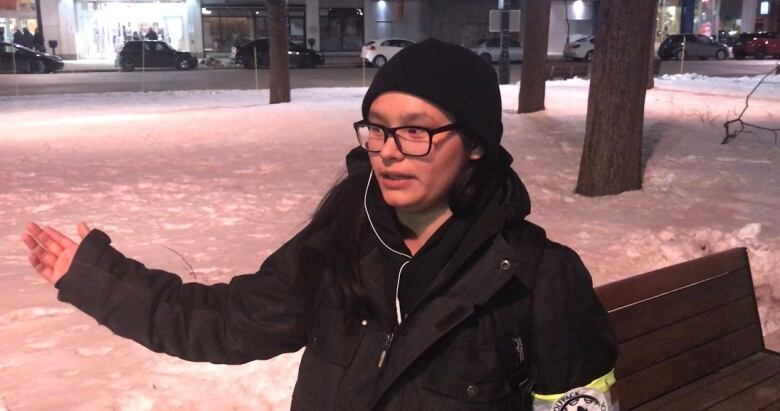
While the volunteers havedifferent backgrounds, they are all motivated by a common goal of helping others. Annie Roussy-Ste-Croix works at a homeless shelter during the day, and volunteers with the Wolf Pack at night. She said being "a familiar face to some of them gives them a sense of security so it's an extra helping hand."
The Anglican Church of Canada is in the process of reconciling its relationship with Indigenous Peoples, and the Diocese of Montreal is a part of that movement. Reverend Brian Perron, who is with glise de l'piphanie, an Anglican church in Verdun, joins the Wolf Pack Street Patrol regularly.
On Tuesday, he came with his wife for her first patrol. While they are both personally inspired to help people in need, Perron also feels his role as an Anglican minister is to be a part of reconciliation.
"We came, we were starving, you protected us, you took care of us. And then what did we do?" he said.
"I think the time has come for us to really come together and change this world."
Search for funding
Getting funding is a goal for Harrington and the Wolf Pack, but he said the wait to get that could be anywhere from to six months to a year, adding that for people on the street "the time is now and the need is now." So for the time being, the Wolf Pack operates mostly out of the volunteers' pockets. More donations are coming in for supplies such as clothing and bread as word gets out.
A new homeless survey in Montreal is coming up later this April. While the numbers might change from the last count, there will certainly still be people who will need a helping hand from the Wolf Pack.
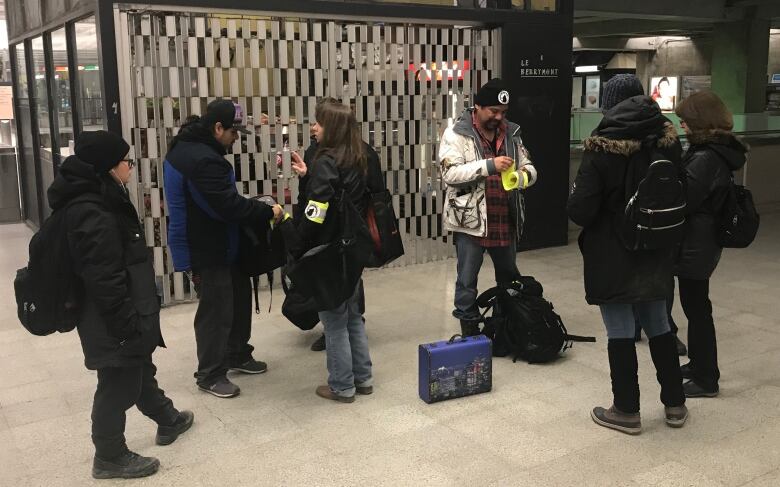












_(720p).jpg)


 OFFICIAL HD MUSIC VIDEO.jpg)
.jpg)



























































































